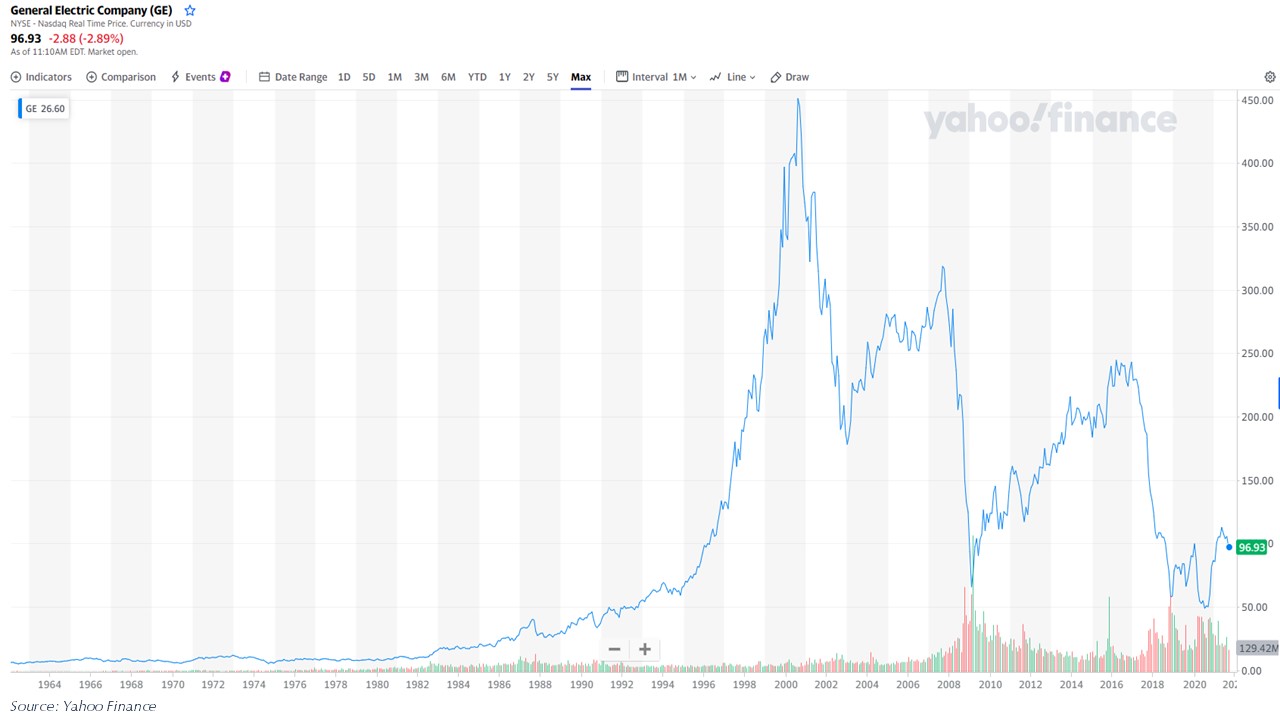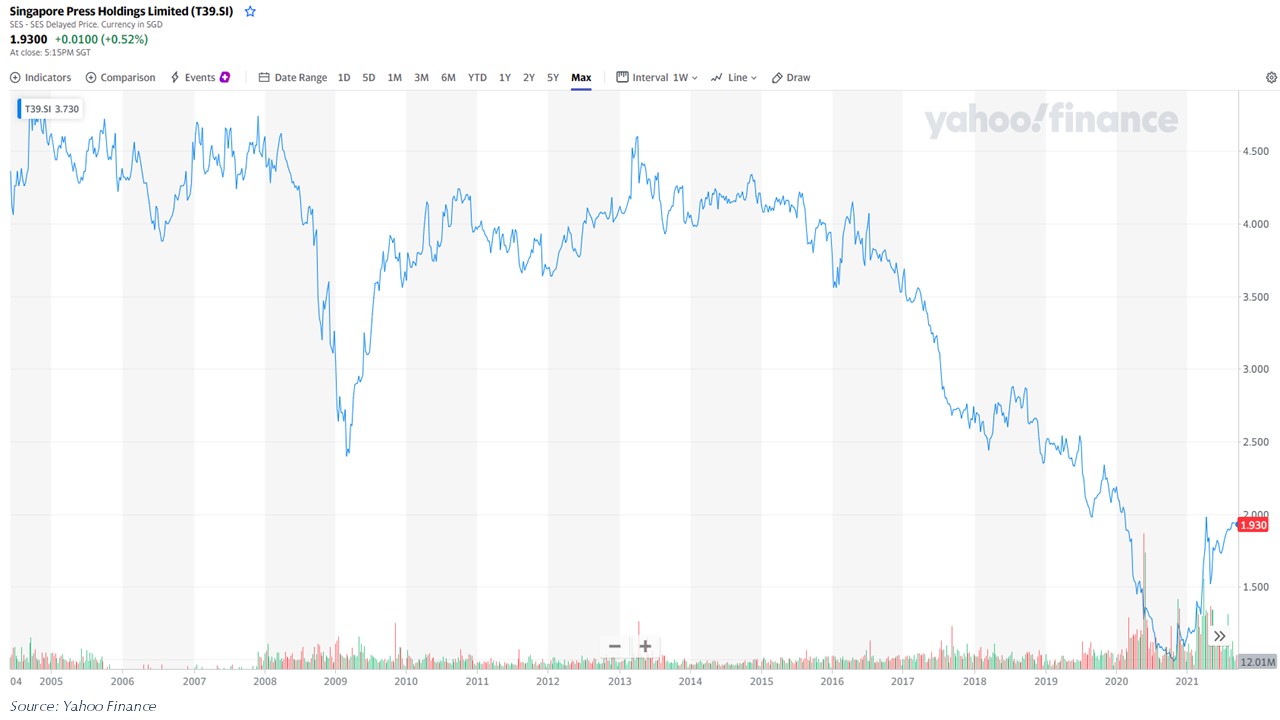It is quite a common occurrence to hear from people that they are into purchasing blue-chip stocks. In fact, I started that way myself by buying a few DBS shares here and a handful of Singtel shares there, slowly trickling my way to owning a tiny portfolio of the biggest household names.
However, it turns out that sometimes they are not all they are made out to be, and that often gets me thinking about what better alternatives are out there. As I learned more and more about investing, I slowly began reducing my exposure to these individual holdings and exploring other options. Let me show you what I mean and where I found some answers.
What we love about blue-chip stocks.
The initial appeal, of course, is obvious. They are usually large, established, well-known companies thought to be profitable, stable, and even (dare I say it!) “low-risk”. We think they are the companies that can withstand the test of time, and that they are in some ways big enough that they will never fail. Often, they are conglomerates too which we may think is excellent for some sort of internal diversification. It is a bonus that they often pay out decent dividends because cash in one’s pocket is always a good feeling.
Sadly, blue-chip stocks do not last forever.
For example, the General Electric Company (GE) which has been listed in the US since 1896, was a reliable stock market performer and dominant, innovative company for more than a century. Over its history, it had managed to continue growing up until the 2000s when it began having trouble, was hit hard by the 2008 financial crisis, and has struggled to regain traction ever since.

Closer to home, Singapore Press Holdings (SPH) which was first listed here in 1984, had often been considered to hold local blue-chip status, but in recent years has seen a rapid decline, in no small part due to difficulties it has been facing in digitalising its news media business.

When looking at these examples, we can begin to see that blue-chip companies are not as invulnerable as they can sometimes seem. Investing in one, two, or even a few, of these companies presents us with significant risk despite the false feeling of security.
How can we do better?
Maybe we could have seen that they were not faring so well, gotten out of these companies early enough, and then re-invested into other up-and-coming blue-chip candidates; or maybe we could have invested in a larger number of these blue-chip names so that we were more widely diversified and protected against significant loss when any individual company did poorly.
If you think about it, though, what both these possible improvements in the management of our stock portfolio point to, are elements that are already built into a different solution.
If you are a client or have been following us at Providend for a while, you may already see what I am getting at.
The ultimate blue-chip investment?
When I found myself wondering if there was a better way to scratch that blue-chip itch rather than to buy those individual stocks, I ended up asking myself what else comes close to having all these rather desirable traits.
In the end, it just took a little re-framing and adjusting of my perspective, to realise that a well-designed portfolio of index funds will do the job just as well, if not better, while exhibiting some remarkably similar qualities.
Here is why:
- The stock market has been around since… well, the start of the market.
One of the reasons people love blue-chip counters so much is on account of their seemingly time-tested ability to endure hard times and survive over the long term as businesses—the kind that allows them to continue operating successfully for decades (even a century or more).
When we are talking about the entire stock market or investing using instruments that effectively approximate what holding the entire market would be like, we can consider the fact that the market has lasted as long as pretty much every individual listed stock.
And it has not only survived, but thrived, creating huge amounts of wealth for investors.
- The stock market is like a massive, monopolistic conglomerate.
Another selling point of blue-chip stocks is that they are usually very large, have dominant positions because of durable economic moats (read: positional advantages), and often have some diversified lines of business.
If we look at the market, we will find the same. It is humongous and is extremely diversified across regions as well as sectors.
And, if you think about it, the market owns every sale. If you can effectively own the market, it does not matter whom the consumer buys from, you win when they purchase.
- The stock market undertakes R&D, and external successes can be “acquired”.
Like many blue-chip companies, the market, by extension, also benefits from all the continuous R&D that goes into innovating and improving its products, productivity, and profits.
And external successes (read: innovative start-ups) are essentially “acquired” when they finally list, become part of the broader public market and grow sufficiently to warrant addition to the world indices. Established companies that fall out of favour, on the other hand, are eventually dropped.
- The market is too big to fail.
Neatest of all, while blue-chip companies are sometimes considered big enough to pose systemic risk when things go wrong, and thus may receive strong support from governments when they are in tough spots, the market itself is the very definition of too big to fail.
At this point, the fate of the world’s financial system is so tied into the stock market that when things get awry you can bet that the most capable people and governments across the globe will be doing everything they possibly can to keep it afloat.
Imagine people and capitalist governments the world over aligned in a singular mission to help your portfolio succeed.
In short, if you love blue-chip investing, but are looking for a something better, perhaps try using a well-built portfolio of index funds designed to capture the returns of the market. With a little imagination, you can convince yourself that you are one of the owners of the largest and most powerful blue-chip company on the planet. When you think about it that way, I am sure you will love it too.
This is an original article written by Bryan Chan, Client Adviser at Providend, Singapore’s First Fee-Only Wealth Advisory Firm.
For more related resources, check out:
1. How Can I Invest Confidently?
2. An Honest Take on ESG Investing
3. Where to Invest Your Money When Inflation is High
We do not charge a fee at the first consultation meeting. If you would like an honest second opinion on your current estate plan, investment portfolio, financial and/or retirement plan, make an appointment with us today.

